
Related
Salvadoran poet and writer Javier Zamora discusses the roots of his memoir Solito, which details his odyssey as an unaccompanied 9-year-old child through Guatemala and Mexico to reunite with family in Arizona. “After surviving that nine-week journey, surviving the United States as an undocumented person was perhaps the main reason why I became a writer,” Zamora says. He describes how he works to cope with trauma from his experiences, and how he was inspired to become a writer when he was exposed to the Chilean poet Pablo Neruda as a high school student in California.
Transcript
AMY GOODMAN: This is Democracy Now!, democracynow.org, The War and Peace Report. I’m Amy Goodman.
We turn now to Javier Zamora. He’s a Salvadoran poet and writer whose New York Times best-selling memoir, Solito, tells the story of his own odyssey to the United States as a 9-year-old boy, from Salvador across Guatemala, Mexico, eventually through the Sonoran Desert. He traveled unaccompanied by his family by boat, by bus and by foot. After a coyote abandoned his group in Oaxaca, Mexico, Javier made it to Arizona with help from other migrants. I asked him to talk about where he was born in El Salvador and how he ended up coming to the United States.
JAVIER ZAMORA: Well, I was born in 1990 in a small fishing rural village of El Salvador called La Herradura. And, you know, I was born during war time. And because of the Salvadoran Civil War, that started in 1980, ended in 1992, my dad fled in 1991. The war ended, but the war didn’t end at the same time, so my mom left my country in 1995 —
AMY GOODMAN: Javier —
JAVIER ZAMORA: — and I was left at the care — yes?
AMY GOODMAN: I’m only interrupting for a moment, because before you take us on that journey, if you could expand more on when you said your father left? You’re talking about a country where the U.S. backed the military in Salvador, well known for killing thousands of Salvadorans. Can you give us a picture of what that U.S. policy meant? Because I think that is what is so absent from so many discussions as people now try to make their way to the United States.
JAVIER ZAMORA: You know, at one point, only Israel was getting more money than El Salvador in the ‘80s, and we’re talking millions of dollars a day. And before the U.S. got involved, the left was winning. And what the left wanted was equality, women’s rights and education. And because of those asks, my dad was a leftist, and he was a head of a coop. One of his older brothers was disappeared by the military in 1980, and the violence was everywhere. And because of those reasons and because of his ideological leanings, he had to flee in 1991. And same with my mom. You know, it is still difficult in my country in 2023, and also in this country, being a woman. There’s a lot of gender-based violence. And because of — you know, you were talking a lot about sexual assault, and that is everywhere. And those were — that was a huge reason why my mom also fled the country.
AMY GOODMAN: And so, you were what? One year old?
JAVIER ZAMORA: I was 1 when my dad left, and I was 5 when my mother left.
AMY GOODMAN: Being raised then by your grandparents.
JAVIER ZAMORA: Mm-hmm.
AMY GOODMAN: And talk about them deciding for you to take this journey, and how you traveled.
JAVIER ZAMORA: You know, the moment that my dad left, he would — we would communicate via letters and phone calls. When my mom left, it was the same thing. And what they both told me was that they were going to come back. And we have to remember that in the brief period of time El Salvador had peace, and that was — it lined up with my childhood. 1993 'til 1999 was perhaps the most peaceful moment in my country's timeline. But in 1997, you know, people were beginning to get shot in my home town, and my parents changed from “We’re going to return to El Salvador” to “You’re going to come be with us in the United States.”
And so, from 7, 8 and 9, I knew that I wanted to be reunited with my parents. What kid doesn’t want to be and wake up next to his parents? And so, I didn’t really understand how I was going to get here or how dangerous it was for me to travel the 4,000 miles that I did. But what I did know is that I loved my parents, and I really, really, really wanted to be with them.
AMY GOODMAN: So, you went with your grandfather from Salvador to Guatemala?
JAVIER ZAMORA: Mm-hmm, yes. So, my dad — my dad — my grandpa accompanied me all the way to a border town called Tecun Uman, which is still a very major crossing hub. And from then on, he gave me over to the coyote, a smuggler, and I wasn’t the only one with him. I was part of a larger group of seven other immigrants. And he, the smuggler, was supposed to bring us to the United States in as little as one week from Guatemala. And, of course, that doesn’t happen.
AMY GOODMAN: And then your grandfather leaves. And talk about how you traveled on from there and the massive danger. I mean, you almost didn’t make it to the United States. If you could then talk about going through to Mexico and what happened?
JAVIER ZAMORA: You know, I still don’t know why my trip took the turns that it did. But the plan was for me to cross a river from Guatemala into Mexico. That was the original plan. But I have done some research, and already in 1999, the Mexican government was militarizing the southern border. And this is also continuing to happen now. And so, because of that militarization, the coyote thought that it would be easier for us to cross into Mexico if we took a 22-hour boat ride from Guatemala to bypass Chiapas and land in Oaxaca. And that is what we did.
But when we were supposed to get on the boat, there were news that three boats had capsized and immigrants died. And this is still happening in the southern borders as people are trying to get over here. So, that was my fiasco and, like, number one when I was so close to death. As a 9-year-old, I didn’t really understand it as such. What I understood was that I couldn’t swim and that I was scared of sharks, and I was scared of the night. So those were my fears. In reality, I was very close to death on that boat. And that was my first day in Mexico.
And when we land, we also face a checkpoint, which still happens daily all over Mexican states against Central Americans and other immigrants. And because of those checkpoints, in 1999, we were dragged out and robbed by the Mexican military. And from then on, it was weeks until we — “we” meaning the group of six other immigrants — until we figured out how to make it to the Sonoran Desert and the U.S.-Mexico border.
AMY GOODMAN: So, talk about crossing the border and what it meant to be in the Sonoran Desert. I mean, you have obviously a very different experience right now living in Tucson, Arizona, but what it meant to cross and then to be there, to survive in the hot, parched desert?
JAVIER ZAMORA: You know, similar to the boat, I, as a kid, my 9-year-old brain didn’t — I think, subconsciously, I knew how close to danger I was. But in the front end of my brain, I was like, “Oh, look at this weird plant called a cactus, and I’m really thirsty. I don’t have food. But if I keep on walking, my parents are at that finish line.” So, that’s how I understood this as a 9-year-old.
All of the adults around me, by that point that we made it to the U.S.-Mexico border, it wasn’t only the six. There were immigrants from Ecuador. There were immigrants from Cuba. There were immigrants even from Brazil at that time, who we all joined together in a group, I want to say, 50-plus.
And each try, which it took me three tries to cross the Sonoran Desert, we suffered a lot. You know, the first time, we were apprehended by Border Patrol, and I spent two nights or one night — because I blacked my incarceration up — I blacked it out. And so, I spent either 48 hours in detention — and, you know, we hear about the effects of detention. I spent less than three days in there, and I still suffer PTSD from those few hours that I was there. And that was only my first try at crossing the desert. The second time, we ran out of water. And we, ironically, were rescued by a Border Patrol agent after we needed to get water from a ranch. And we were released back into Mexico. And finally, the third time, we finally made it.
AMY GOODMAN: Let’s jump forward to how you do convey this, how you became a writer. But first, tell us how you met your parents, how you saw them in the United States, and then who influenced you, how you came to be a writer through all of this trauma.
JAVIER ZAMORA: You know, I left El Salvador on April 6th, 1999, and I finally met my parents on June 11th, 1999. And I opened a door in Tucson, Arizona, which, ironically, is my home now, and I see two shadows. And I recognize my mom, because she left me when I was 5 years old. And I see this man behind her. And I knew how my father looked or what my father looked like from pictures, but pictures and reality are two different things. And so, he was a stranger. And I think that’s a metaphor for how I felt after not being around him for eight years. And it took us a few, I want to say, months until I got comfortable with not only my dad, but with my mom, being in this country.
And I had to live with the fact that, you know, we were all undocumented. From 1999 until I’m 21 years old, I don’t have papers, and I can’t return to my homeland. And I think that fact is a huge reason why I became a writer. And it was in high school that — you know, when Google becomes Google, that I google Salvadoran writers, and the first name that comes up was Roque Dalton, who is a leftist writer who wanted to create a better El Salvador. And I start reading his work. And what really impacted me was that Roque Dalton spoke like us, and he wrote like us, meaning the rural Salvadorans, not the elite Salvadorans who wanted to replicate Spain Spanish, but he wrote like the people. And I hope that in my — both my poetry and my prose, I am in tune with our Caliche, which is Salvadoran slang. And that’s all I wanted when I was 13, 14, 15 years old and I was searching for Salvadoran books. And I hope that my book now could speak to another 9-year-old Salvadoran, Guatemalan, Honduran kid who has immigrated or is thinking of immigrating to this country.
AMY GOODMAN: After break, we’ll continue our conversation with Salvadoran poet and writer Javier Zamora, author of the best-selling memoir Solito.
[break]
AMY GOODMAN: This is Democracy Now!, democracynow.org, The War and Peace Report. I’m Amy Goodman, as we continue our conversation with Javier Zamora, the Salvadoran poet and writer. His best-selling memoir, Solito, tells the story of his own odyssey to the United States as a 9-year-old boy from his home in El Salvador. I asked him how he became a writer.
JAVIER ZAMORA: After surviving that nine-week journey, surviving the United States as an undocumented person was perhaps the main reason why I became a writer. And it was almost like a chance encounter. You know, as an only child and a child of immigrants and an immigrant myself, my parents always wanted me to be a lawyer, even an accountant, or an engineer, you know? To them, I think, I just needed to go to college in order to make money. And so, writing was never in the cards for me. But, thinking back, you know, this is before Facebook, and, you know, we were very poor in El Salvador, so we didn’t have a phone line. So our main means of communication with my dad, when my mom was still there, like, I would write him letters, as early as 4 years old. And once my mom left, I continued that. And I think that was my practice into my eventual writing life.
But being in this country, you know, it took a chance encounter of a local poet by the name of Becky Foust to go into my high school and teach us about Pablo Neruda. And I had never — I had heard of Pablo Neruda, because my parents are nerds, and they had his recordings at home. But I’d never seen his name in classrooms up to that point. And what the poet chose to do was focus on Spanish and English side by side. And for some reason, that was all I needed for me to begin to want to be a writer.
And from then on, you know, I volunteer with a local organization called 826 Valencia, that got started by Dave Eggers. Dave Eggers becomes the very first writer, living writer, that I meet. And then I go to college, but I don’t go to college to become a writer. I go to college wanting to be a historian. But on the side, I’m writing. And I’m taking, you know, electives for — in ethnic studies and English in the English Department. And that’s when I encounter June Jordan’s work and her idea of — that poetry is for the people. And that is a program that I take at UC Berkeley, which is Poetry for the People. And all of this kind of convinces me that perhaps writing can be a thing that I can do as an undocumented person, as a Salvadoran immigrant. And these become the foundation and the tools that I have, and, eventually, that I have to write my first book of poems, and now a memoir.
AMY GOODMAN: And, Javier, though writing, of course, can be such a cleansing experience, you have gone through so much trauma in your life. Even when you just read news reports of what’s happening on the border, do you find yourself experiencing post-traumatic stress disorder? And how did you deal with this trauma as you grew up, in addition to writing?
JAVIER ZAMORA: Anger. You know, I was — anger is often the first emotion that you have when you don’t have the other words for it. And for myself, that anger began in middle school. You know, I didn’t know why I felt this way, but I did know subconsciously. I felt different than all the other children. I think it’s as a 9-year-old, 10-year-old, you have no conception of what it means to be documented and undocumented. And I think at 16 and 17, I began to see those concrete results of me just being me, but the world viewed me as less than because I didn’t have papers or I didn’t have documents, so my life got a little bit more complicated. And writing becomes that thing in which is, for lack of a better term, free therapy, but is not therapy.
And so, once, in 2011, which is when I’m 21, and 2010, I think that the American news cycle begins to really focus on immigration, peaking in 2016, 2017, with the child unaccompanied minors crisis. And I say “crisis” because, as an unaccompanied child myself, it really angered me that it seemed to me, an unaccompanied child, that the news media was — didn’t recognize that there had been many thousands of unaccompanied children prior to this crisis. So the crisis wasn’t a crisis that started in 2016, but had been a thing that all of us — because I’m not the only unaccompanied child that has come to this country. But it made me feel as such, and anger was the main means through which I tried to process my unprocessed thoughts.
And so, short story is, yes, you know, every news cycle retraumatized me. And it made it harder, ironically enough, for me to do the work that I eventually do in writing this memoir, because when it’s all around you, and I feel constantly erased and triggered and retraumatized, it stopped me from really going into those memories and understanding them and unpacking them, which, you know, at 29, I also had a chance meeting with a great therapist. I had had therapists before, but I think I needed another immigrant. And she’s from the DR, and she immigrated here when she was 4 years old. And I think I needed a child immigrant to also be my therapist, which doesn’t usually happen. It’s very difficult. But that really changed my life.
AMY GOODMAN: And talk about how she changed your life. Talk about that mutual experience and why it made such a difference in your therapy.
JAVIER ZAMORA: You know, in therapy, you have to repeat things until they hit. And perhaps other therapists that I had before Caro, which is my therapist’s name, had told me this before, but it never landed, until she told me. And what she told me was this, that you — up until that point, I sincerely thought that you go to therapy in order to forget or to erase what has happened to you. But that’s not the case. What Caro said, “What happened to you, you can never take back. It happened to you, and it will follow you for the rest of your life. If you accept that, why not — instead of running away from that trauma, why don’t you try to understand it?”
And for me, that trauma is embodied in this 9-year-old kid. I was trying to run away from that kid. I was trying to erase that kid, because I felt shame. And I felt shame of that kid because of all the news coverage, how politicians talk about immigrants, etc., etc., etc. And once she told me that, I began to look at him — meaning me, my 9-year-old self — differently. And to this point, after now four years of therapy, I’ve learned that instead of being ashamed of 9-year-old Javier, I should be super proud of the superhuman capacities that that little child showed in order to survive. And those are things that should never be questioned and should never be made to feel negative, anybody feel negative about. You know, I survived the unsurvivable, and I’m a stronger person for it. Do I wish it never happened to me? Absolutely. But it happened. And I’m beginning to understand that that kid will be with me until I die.
AMY GOODMAN: You’re going to be speaking tonight on a panel put on by the PEN America World Voices Festival that’s headlined “How We Became/Become: Latinidad, Identity, & Love.” And if you could just preview for us what you want to say there, and also if you can talk about finding love in this country, and what that has meant for you?
JAVIER ZAMORA: You know, Latinidad is a complicated thing. You know, it’s not a race; it’s an ethnicity. And what has really helped my healing, you know, like therapy, is accepting the different parts of who I am, as well, primarily accepting and recognizing my indigeneity, which in my country of El Salvador, we have had a very, very complicated relationship, like most countries in Latin America, with our Indigenous community. Infamously, you know, there was one of the biggest massacres in Latin American history in 1932, which was genocide, was Indigenous genocide. But that is the culmination of many other genocides in my country against the Black and Indigenous communities.
And so, for me, again, talking about shame, instead of feeling shame, I have learned to love that part of me. You know, this nose doesn’t come out of nowhere. I am Nawat, Pipil. I am that. And sadly, our language has been lost in our sect, but it is still alive in another region of the country. And learning to love those parts of ourselves, I think, is very important to understanding our Latinidad, understanding who we are. And also, being open to different paths towards that love is also very important.
And now, in a more concrete way, finding the person that encourages you and pushes you towards that has also been part of my healing. You know, I’m married now. I never thought that I was going to be married. I’ve had a complicated relationship, being undocumented, in my belief of marriage. By that, I mean that, sadly, for most of us, that is the only way for us to get citizenship. And so I’ve refused it for a big part of my life. And so, unpacking all of what I just mentioned in therapy, that’s also, finally, made me believe in love and that you could find a union with another person. And, you know, that has occurred for me. And we, you know, help each other. She is a survivor of a different type of trauma, and we understand that about each other.
AMY GOODMAN: As you talk about being documented and undocumented, for people to understand your life experience, I mean, you made it. You survived in your journey to the United States. And yet, as you grew up, as you went to school, in high school, you weren’t documented. How did that make you feel? And how did you ultimately become documented? And what do you think it’s most important for people to understand in a country like the United States, where there are so many millions of undocumented people?
JAVIER ZAMORA: You know, a lot of the coverage for undocumented people has also been this coverage of DREAMers, you know, and I think that’s how a lot of nonimmigrants have understood what it means to be undocumented and undocumented. And for us, who actually are those things, this idea that you must be the best of or you must be the greatest citizen in order to even be considered a citizen is really traumatizing. I don’t think it’s a coincidence that my CV is of an overachiever. You know, I’ve internalized those things, that rhetoric of “if you want papers, you must be the best.” And I don’t think it’s also a coincidence that the one path available to me towards citizenship, outside of marriage, is this visa called an extraordinary abilities visa, or an Einstein visa, which was open to me because of my poetry. And just the title itself, “extraordinary,” backs up that rhetoric of I must prove that I’m more than in order for you, the U.S. government, to consider me normal. And that is so taxing, and it’s tiring.
And I hope that we can begin to think outside of those — that terminology, that anybody can and should be able to become a citizen, whether they’re a straight-A student or a terrible student, or whether they came here by a certain timeframe, which is how we talk about access to becoming a DACA recipient or not. I think that anybody, regardless of their age or when they came to this country, should be seen as a complete human being and should have the freedom to apply for citizenship and be considered a citizen.
AMY GOODMAN: And when you were in high school, did your friends know that you were undocumented? Did you know that you were undocumented? And what did it mean for you to go through that process?
JAVIER ZAMORA: You know, your brain does wonderful things. I knew that I was different, because my — the moment that I got to this country, because my parents told me not to ever tell anybody how I had gotten here, and then they told me to tell people that I was born at the Marin General Hospital, you know, which was a lie. And so, as a teenager, I think I began to really believe that lie. And it wasn’t until I was faced with the consequences of, “Oh, it’s going to be harder for you to get a license,” “Oh, you can’t apply for FAFSA,” “Oh, you can’t apply for a Pell Grant” — you can’t really do all these things that normal citizens can.
And again, a survival tactic was for me to just keep all that information to myself. My closest friends didn’t know that I didn’t have papers. And I don’t — I never really told them that. I think they found out through my writings. It’s weird, because I’m very public about it, but in my personal life, I’m still very private. I don’t really talk about it. And I think that shows you the amount of trauma, packed on top of the trauma of crossing the border and those nine weeks of being by myself, and then being undocumented. It just, you know, just builds up on you.
And luckily, I’ve had the privilege of, you know, getting a green card and finding the right therapist, which is another thing in itself, that I’m here at the stage of my healing that I am now. But it is a privilege, and not a lot of us previously undocumented or undocumented people can afford.
AMY GOODMAN: So, Javier Zamora, as we wrap up, you first wrote this collection of poems called Unaccompanied, and now you’ve written your memoir, Solito, a memoir. What next?
JAVIER ZAMORA: I don’t know. Hopefully another book depicting exactly what we’ve been talking about, you know, how difficult it is for us survivors of one form of trauma to then be thrown against the immigration system as an undocumented person, and what that does to a teenager, and how we learn to cope or not cope with what we internalize. So, that’s what I’m working on. It will probably focus on my time of June 11th, 1999, until like eighth grade. So, that’s the next step.
And again, I think writing, for me, prose writing, has become a way to heal and to understand different time periods of my life. You know, me and my 9-year-old have a great relationship now, but me and my middle school self, not so much. And writing will help me get there.
AMY GOODMAN: The Salvadoran poet and writer Javier Zamora, author of the best-selling memoir Solito. He’s also author of Unaccompanied, a collection of poems about his experience migrating to the United States as a child to reunite with his parents.
And that does it for today’s show. Democracy Now! is produced with Mike Burke, Renée Feltz, Deena Guzder, Messiah Rhodes, Nermeen Shaikh, María Taracena, Tami Woronoff, Charina Nadura, Sam Alcoff, Tey-Marie Astudillo, John Hamilton, Robby Karran, Hany Massoud and Sonyi Lopez. Our executive director is Julie Crosby. Special thanks to Becca Staley, Jon Randolph, Paul Powell, Mike Di Filippo, Miguel Nogueira, Hugh Gran, Denis Moynihan, David Prude and Dennis McCormick. I’m Amy Goodman. Thanks so much for joining us.

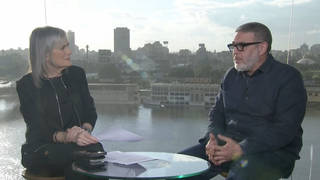
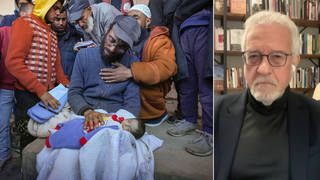
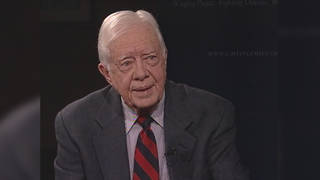
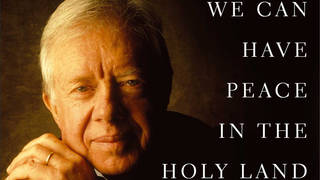





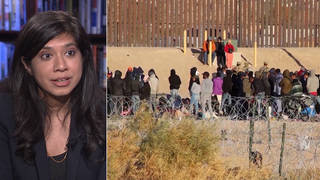
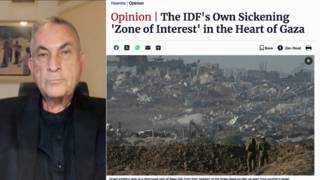
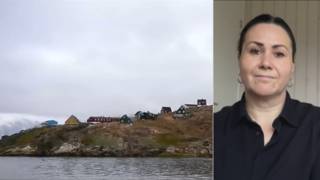
Media Options